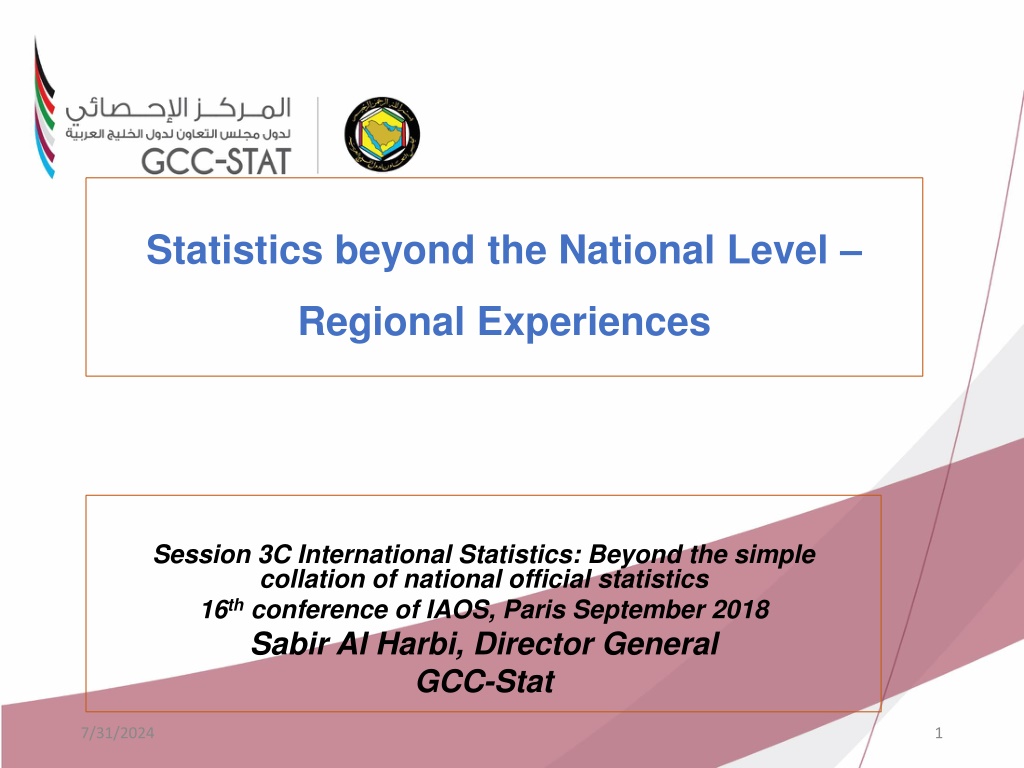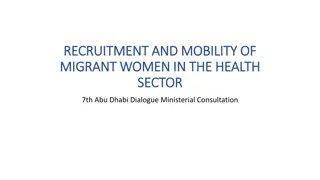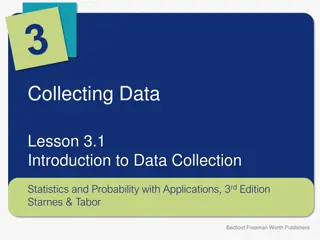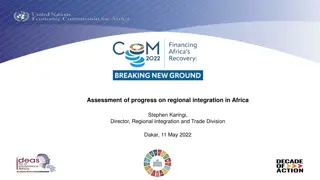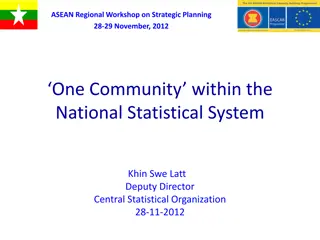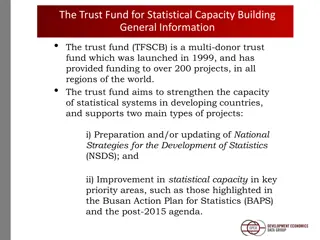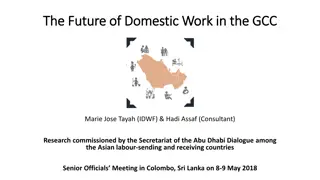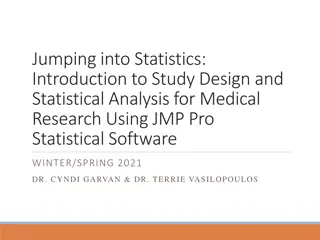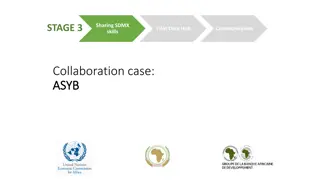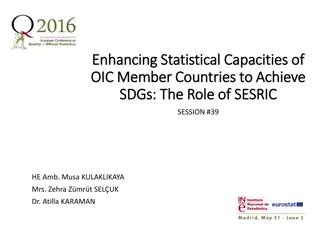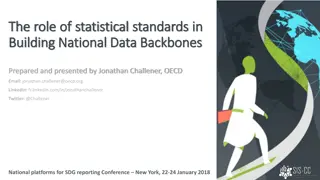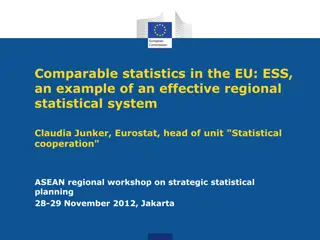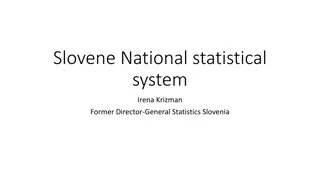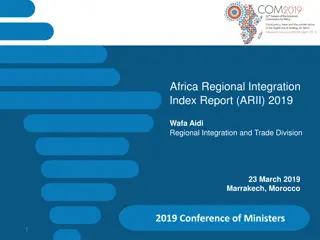Enhancing Regional Integration Through Statistical Collaboration in the GCC
Regional statistics play a crucial role in informing regional policies, monitoring progress, and assessing developmental outcomes. The Gulf Cooperation Council (GCC) has established GCC-Stat as a regional statistics center to meet statistical requirements at the GCC level. By improving regional data to support policy processes, the GCC aims to enhance statistical reporting, strengthen links between policy needs and statistical reports, and shape requirements for harmonized projects, ultimately facilitating better collaboration among member countries.
Download Presentation

Please find below an Image/Link to download the presentation.
The content on the website is provided AS IS for your information and personal use only. It may not be sold, licensed, or shared on other websites without obtaining consent from the author. Download presentation by click this link. If you encounter any issues during the download, it is possible that the publisher has removed the file from their server.
E N D
Presentation Transcript
Statistics beyond the National Level Regional Experiences Session 3C International Statistics: Beyond the simple collation of national official statistics 16th conference of IAOS, Paris September 2018 Sabir Al Harbi, Director General GCC-Stat 7/31/2024 1
Regional Integration and Statistics Many forms of regional integration (Free Trade Agreement, Customs Union, Common Market, Economic Union, Political Union) Different motivators dependent on specific circumstances e.g. economic cooperation, security But all forms of Regional integration require comparable statistics to Inform and evaluate common regional policies Guide and monitor progress Assess impact on developmental outcomes, regional and national level Regional Statistics Agencies Key source of regional statistics 7/31/2024 2
GCC-Stat Regional Statistics centre in the GCC GCC-Stat established 2012 role includes meet statistical requirements at the GCC level . GCC Regional framework Gulf Cooperation Council, formed 1981, comprises United Arab Emirates, Bahrain, Saudi Arabia, Oman, Qatar and Kuwait. GCC Secretariat responsible for cooperation, coordination, planning and programmes for common action, reporting on work undertaken by GCC Specialist organisations, under umbrella of GCC Secretariat, e.g Gulf Health Council, GCC Standardisation Organisation Regional Statistical requirements: Statistics to inform regional policy development and preparation process High level indicators on direction of region and showcase region Statistical analysis and information to support GCC Secretariat in monitoring implementation of Leaders Decisions Statistical analysis and reports to specialist GCC organisations 7/31/2024 3
GCC Statistical System GCC Secretariat Country Statistical Systems GCC GCC-Stat Organisations International Reporting (e.g. UN, IMF) 7/31/2024 4
Case Study 1: Improving Regional data to support Policy process GCC level policies Primarily issues at GCC level, and/or issues common to all member countries Prepared in GCC technical committees, supported by the GCC Secretariat Reviewed, endorsed/ amended by relevant Ministerial Council, and annual Supreme Leaders meeting GCC-Stat Reviewed policies, identified requirements (eg indicators) Identified gaps in existing data Set up project to identify administrative data to meet gaps Initiated Integrated End to End Platform to enhance supply, management and dissemination of statistics Strengthened statistical reporting Enhanced links between policy needs and statistical reports Other Impacts on GCC Statistical System Shaping requirements for Harmonised projects Helping member countries to provide more data 7/31/2024 5
Case Study 2: Statistical indicators to measure implementation of High Leaders Decisions Project has Prepared inventory of decisions and mapped shortlist to GCC policy framework. Conducted focus groups with Gulf institutions Collected data, with help of NSIs (2017) Preparing indicators, to assess extent of compliance Provided range of reports, including dashboard for decision makers (2018) Impact on GCC Statistical system Identifying and including GCC level requirements into Harmonised Projects, e.g. New standard report requirements for Nationality base indicators (Local Citizen, Citizen of other GCC countries, Non-citizen) Identifying GCC multinational companies (working across GCC), with implications for other economic statistics projects Helping to move GCC-Stat from Supply driven (Outputs based on adding up available data) to Demand driven (Outputs that meet the needs of regional users high quality, relevant, transparent) 7/31/2024 6
Regional Data Challenges Data not harmonised (e.g. inconsistent, unclear concepts) Missing data, Different reporting periods Delays in reporting Examples Unable to provide Regional level statistics Regional data not timely or relevant Impact Harmonised projects for priority topics End to End Platform to improve supply, management and dissemination of data Administrative based Indicator project to increase supply of data Investigating Nowcasting, appropriate Missing data treatment Medium term, alternative sources (e.g. Regional Big data sources) Response 7/31/2024 7
Discussion Points Being relevant to Regional Users and supporting Regional Integration means Providing data about the Region, as a entity Specific analysis, including adjustments may be required Regional totals may not just be the sum of country level data Identifying the appropriate data treatment (eg estimation, nowcasting) to meet user needs Country level information in Regional reports may be different in to what is shown in country level reports Discussion Points 1. If Regional agencies need to estimate or revise data, what key steps should they take to ensure the integrity of the national view of the data is maintained? 2. To meet their user needs, Regional agencies may need to use statistics not released or provided by NSIs. Should this country level data be publicly available? 7/31/2024 8
